Climate Adaptation
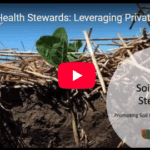
Making Sense of Carbon Markets
A presentation introducing carbon markets by Jean Brokish, Deputy Director for American Farmland Trust; delivered as part of the Soil Health Stewards Program (April 2022).
Watch Video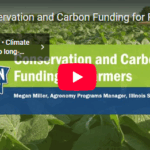
Conservation and Carbon Funding for Farmers
Watch a presentation discussing carbon and conservation funding for farmers by Megan Miller, Agronomic Program Manager at the Illinois Soybean Association; delivered as part of Soy Summit (March 2023).
Watch Video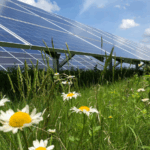
Illinois Solar Siting Overview
In the last year there has been a noticeable increase in the development of commercial and utility scale solar in the Midwest. The rapid expansion creates opportunities for farmers and landowners, but also poses threats to farmland. Illinois must find a way to produce more renewable energy while protecting farmland and serving rural communities. To better understand farmer engagement with solar development, American Farmland Trust (AFT) conducted a survey and in-person interviews with landowners and operators throughout the Midwest. In these conversations, participants described various benefits and drawbacks of solar energy deployment. This summary identifies the most important issues that participants raised, alongside AFT’s research to inform Illinois’ renewable energy strategy.
View Website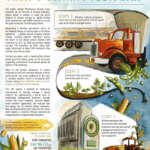
Actively Managing Your Farm’s Climate Footprint
The Nature Conservancy, American Farmland Trust, Wisconsin Land & Water, and the Wisconsin Department of Ag and Consumer Trade Protection (WI-DACTP) collaborated to create a resource to assist farmers and landowners in understanding their farm’s climate footprint. This succinct handout details the types of emissions typically found on midwestern row crop farms and possible pathways to reduce those emissions. This resource underscores how sustainability on the farm connects to the Paris Agreement, the global accord that seeks to avoid the worst effects of climate change by cutting global CO2 emissions 45% by 2030.
Download Documents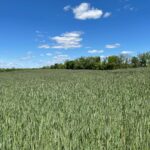
Financing Resilient Agriculture
This report is for agricultural lenders and lending institutions, as well as others interested in understanding the climate risks faced by the agricultural lending sector and the role of agricultural lenders in financing resilient agriculture. This report provides a path forward for lenders to mitigate climate risks and finance resilient agriculture. Our hope is that it is useful to all those who are invested in the future of U.S. farms.
Download Documents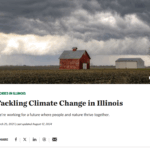
TNC Illinois Climate Assesment
TNC’s statewide climate assessment brought together the expertise of more than 40 scientists and technical experts to explain the most up-to-date information on how climate change is expected to affect Illinois.
View Website- « Previous
- 1
- 2
- 3
- Next »